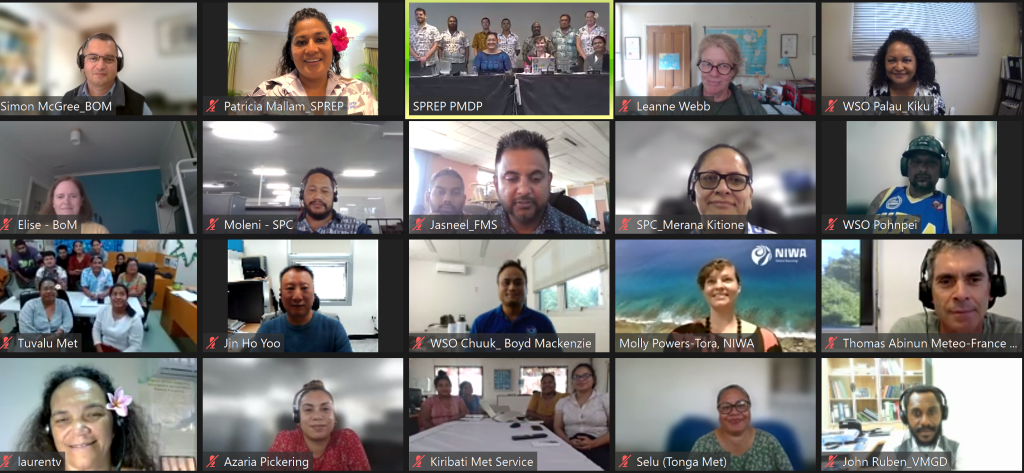
16 April 2024, Yanuca Island, Fiji. Healthy, wealthy, and resilient Pacific communities depend on improved climate services. Our Pacific Islands must fully utilise regional platforms for guidance, knowledge sharing and building capacity of our National Meteorological and Hydrological Services (NHMS) to improve the delivery of climate services to the
This was the message by the current Chair of the Pacific Meteorological Council, represented by Ms Arieta Daphne Baleisolomone of the Fiji Meteorological Services, at the opening of the Fourteenth Session of the Pacific Islands Climate Outlook Forum (PICOF-14), on 16 April 2024 at the Shangri-La Hotel, Yanuca Island, Fiji.
“This is the 14th Session of the Pacific Islands Climate Outlook, and most of our Pacific Islands have been using this platform since its establishment in 2015 for discussions on issues we are having at the operational level and capacity building. I urge our Pacific national Met Services to continue to have these discussions for knowledge sharing and utilisation to guide and build the capacity of our Pacific meteorologists and climatologists.”
The sentiment was echoed by the Secretariat of the Pacific Regional Environment Programme (SPREP), “we must ensure that the information on climate science shared in this forum reaches the last mile in your country so that stakeholders and communities can prepare for the next season. We must influence people’s decisions based on the climate information we provide”, said Mr Naheed Hussein, SPREP Intra-ACP Climate Services and Related Applications (ClimSA) Project Manager in welcoming the forum participants.
“This is one of the main goals of the regional and national user interfaces, such as the PICOF, national Climate Outlook Forums and the monthly ocean and climate outlook forum (OCOF). I would like to encourage engagement and discussions between all of you because this is the main forum where science is discussed practically to support all Member countries.”

The PICOF-14 saw the review of the of the climate of the last six months (November 2023 – April 2024) and outlook for the next six months (May -October 2024). NHMSs also presented the impacts of the current El Niño event in each of the three Pacific sub-regions, Micronesia, Melanesia and Polynesia.
El Niño is the description given to the phenomenon characterised by reduced easterly trade winds and propagation of warmer sea surface temperatures from the western Pacific to the central and eastern equatorial Pacific. Where the phenomenon was expected to result in a number of impacts on the Pacific island countries, including heavier rainfall in the Central and Eastern Pacific and drought conditions in the Western Pacific countries, PICOF Member countries and partners noted the unconventional behaviour of this El Niño event and how it differed from past events.
It is for these reasons that sciences must inform the work of NHMS to produce national climate and oceans information for their national stakeholder’s decision making. This will enable them to take into consideration the complexity of the key variables required when developing seasonal guidance, with the ultimate aim to reduce climate-related risks and support sustainable development.
The PICOFs are implemented by the Pacific Regional Climate Centre Network (RCC-N), and Pacific Islands Climate Services panel (PICS panel). This includes presentations from the RCC Node on Long Range Forecasting members on the seasonal outlook for the next six months. PICOF 14 was attended by 75 participants across the Pacific region.
In acknowledgement of the tenth year of the PICOF, SPREP expressed their gratitude to the RCC-N members for their years of service to the Pacific. “We acknowledge the tireless commitment of the Australian Bureau of Meteorology (BOM), National Institute of Water and Atmospheric Research (NIWA), APEC Climate Centre, Meteo-France, US National Ocean and Atmospheric Administration (NOAA), Pacific Community (SPC) and the University of Hawaii. Through the PICOF, we continue to commit to give the NHMSs actionable and scientific insights to refine national climate and ocean bulletins aligning to our stakeholders and Pacific community needs”, said Mr Hussein.
The PICOF-14 statement with details of the coming season will be available on the 26 April, 2024.
PICOF-14 was held on 16 April 2024 at the Shangri-La Hotel, Yanuca Island, Fiji. PICOF sessions are co-sponsored by the European Union through the Intra-ACP Climate Services and Related Applications (ClimSA) project, World Meteorological Organisation through the Climate Risk Early Warning Systems (CREWS) Pacific SIDS Project, funded by the CREWS Initiative and Environment and Climate Change Canada (ECCC). Australian Bureau of Meteorology (BOM), National Institute of Water and Atmospheric Research (NIWA), Secretariat of the Pacific Regional Environment Programme (SPREP) and Pacific Community (SPC) support is largely provided via the Australian and New Zealand Aid Funded Climate and Oceans Support Program in the Pacific (COSPPac).
For more information, please contact the Pacific Meteorological Desk Partnership at [email protected] or your local National Meteorological and Hydrological Service.